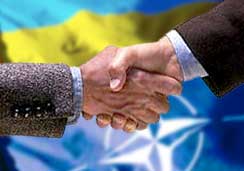NATO unwilling to welcome Ukraine not to spoil relations with Russia
Russia is concerned about the geographical expansion of the military alliance

Russia may ruin Georgia's and Ukraine's plans to join NATO. Moscow's influence has already been exercised in the attitude of the alliance to Kiev. It is not ruled out, though, that Ukraine will have to show the initiative and decline the wish to become a NATO member itself, if Ukraine is not ready to bid farewell to Crimea. 
Foreign ministers of NATO members, Russia and Ukraine gathered for an unofficial meeting in Vilnius, Lithuania, on April 20th. Representatives of leading countries of the globe discussed the increasing political role of NATO, the alliance's relations with the EU and the UN, as well as the situation in Afghanistan, Iraq, Kosovo and in the Middle East. The ministers also touched upon the issues of NATO's relations with Russia and Ukraine.
The two countries have already formed their position on the matter. Ukraine would like to become a member of the alliance. Russia in its turn is concerned about the geographical expansion of the military alliance on account of the aspiration of the latter to approach Russia's borders. In addition, the Russian administration was not happy to know that NATO used far-fetched reasons to explain its refusal to sign the modified treaty about conventional forces in Europe.
A spokesman for the Russian Foreign Ministry, Alexander Yakovenko, has already warned NATO against inviting several countries, particularly Ukraine and Georgia (they border on Russia directly) to join the North-Atlantic alliance. Yakovenko stated that it might exert a negative influence on NATO's relations with Moscow.
The warning from the Russian official has apparently produced its effect. Local newspapers wrote on the threshold of the above-mentioned meeting that Ukraine was about to receive an invitation from NATO to join the alliance. The NATO Secretary General Jaap de Hoop Scheffer stated later, though, that the question of new members in the alliance would be not raised at the meeting in Vilnius.
It brings up the idea that the new Ukraine does not see any difference between the previous Russia-oriented administration of Leonid Kuchma and the incumbent Yushchenko-Timoshenko government, which takes certain steps in the Western direction. Russia has not raised moot questions of relations with Ukraine yet, although it does not mean that there are no such issues at all.
The situation with petroleum products deliveries was supposed to become a lesson to Ukrainian politicians, to make them think about consequences that their ambition might lead to. Ukrainian Prime Minister Yulia Timoshenko has recently stated that Russian businessmen, who control the Ukrainian fuel market, were making fortunes on Ukraine. In addition, Timoshenko ordered the government to reduce retail gas process in the country. As a result, Russian oil companies stopped realizing their products in Ukraine, which made the country find itself on the brink of a social and economic crisis.
A deputy of the Russian State Duma, Viktor Alksnis, has recently released another warning. The deputy stated that Russia would have to touch upon the question of the legal status of the Crimean Peninsula as a part of the Ukrainian territory, if Ukraine continues developing its relations with NATO (Soviet leader Nikita Khrushchev handed over the Crimean Peninsula to Ukraine in 1954).
NATO is not showing a wish to confront Moscow and support Ukraine in arguments with Russia regarding the status of the Crimean Peninsula and the stationing of the Russian Black Sea Navy in Ukraine, NATO spokesman Robert Pszczel said in an interview with Deutsche Welle.
Thus, Ukraine remains tete-a-tete with its problems and ambition again.
Subscribe to Pravda.Ru Telegram channel, Facebook, RSS!


